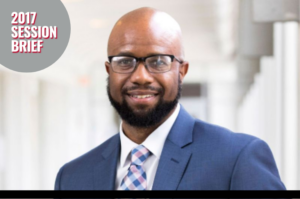By Chris Herbert and Dannie Parker
 According to the CDC, approximately 140 people die in the U.S. from opioid overdoses every day. Georgia’s overdose rate is increasing faster than any other state, and having doubled since 2009.
According to the CDC, approximately 140 people die in the U.S. from opioid overdoses every day. Georgia’s overdose rate is increasing faster than any other state, and having doubled since 2009.
Henry N. Young, the Kroger Associate Professor of Pharmacy at UGA’s School of Pharmacy, led a panel discussion on using health literacy as a tool to combat the state’s rising opioid addiction rates at the State of the Public’s Health Conference in Athens, Georgia on October 17.
Typically, a person’s initial exposure to opioids when they are prescribed by a doctor in a legitimate medical situation. However, not understanding doctors’ jargon or medical literature is directly affecting improper use of opioids statewide.
“At least 14 percent of adults have less than basic health literacy … and 9 out of 10 lack the skills necessary to manage their healthcare properly,” said Aimee Dyal, assistant professor of health promotion at Kennesaw State University
Thirty-two percent of patients receive no communication about their medications from providers and pharmacists, said Michael Crooks, pharmacist and care coordination and interventions technical lead with Alliant Quality. “In healthcare, we do a pretty poor job in discussing these medicines,” Crooks said.
The panel emphasized several techniques for providers to better convey messages to patients without high levels of health literacy. Use of plain language, focused message, visual cues, colors, symbols and “teach back” – requiring the patient or caregiver to explain in their own words back to the provider – have proven to be effective methods. Encouraging patients to be active and asking questions during the visits is vital.
Young stressed the importance of teaching patients about the dangers of incorrectly using the drugs and also about the unintentional harm drug sharing can do to the people they love.
Young was quick to quash the myth of the opioid epidemic being supplied by the illegal drug trade. “Drug sharing is not criminal like we think,” said Young. “Most un-prescribed opioids are given to someone from a family member or friend with the intention of helping that person.”
A muddled medication list also adds to the potential for opioid abuse. Patients with multiple providers are frequently overprescribed opiates, said Crooks. To avoid receiving double doses of opiates, patients and caregivers are encouraged to physically bring current medications to each medical appointment.
“You are the source of truth. Your medicines are the most accurate source that truth. I do best when I get to look at your actual medicines versus looking at a list,” Crooks said.
Young believes professional development education for local physicians and pharmacists will improve patients’ health literacy and help reduce opioid abuse. Working with the UGA Archway Partnership, Young is developing the program for the surrounding Athens area.
And there is more to come. Young is dedicated to combating substance abuse. “One of the things I really get jazzed up about- my overarching goal- is to help patients use medication safely and appropriately.”
